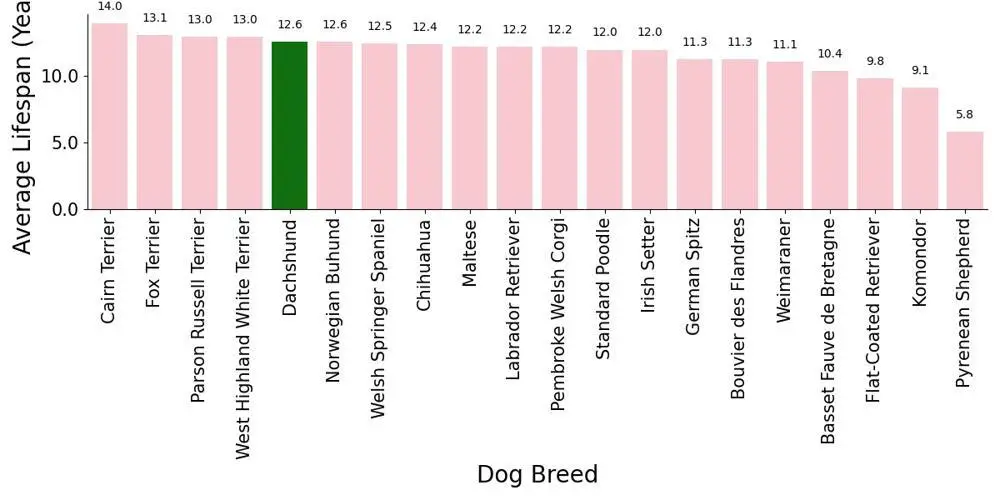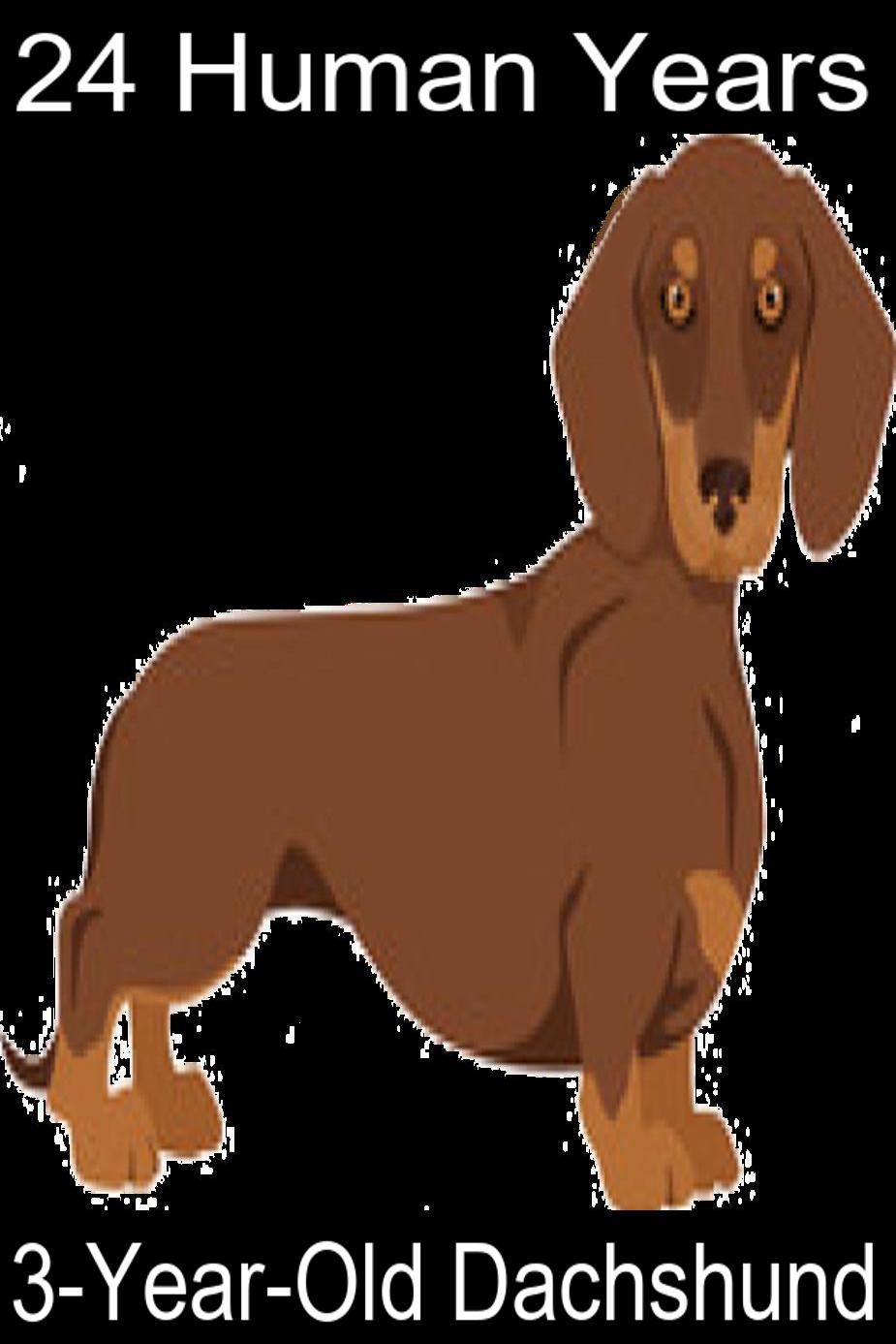Quick Links: Table of Contents
- How Long Dachshunds Live. Dachshund Life Expectancy
- Lifespan of the Dachshund Compared to Other Dog Breeds
- Common Causes of Death in Dachshund, and how to Prevent Them.
- How To Prevent Genetic Problems in Dachshunds
- How Old is Your Dachshund in Human Years
- How Long Do Dachshunds Live in Human Years?
- More Ways to Make Your Dachshund Live Long
- Conclusion on Dachshund Life Expectancy
How Long Dachshunds Live. Dachshund Life Expectancy
Generally, the lifespan of the Dachshund is from 12 to 15 years.
Moreover, a few years back, British Veterinarinan researchers performed a scientific study to determine the lifespan of the Dachshund. In this study, the scientists collected data on how long 245 pet Dachshunds lived.
From the study, it was found that Dachshunds have a average lifespan of 12.6 years. Furthermore, the study found that Dachshunds can live for as long as 19 years.
Furthermore, researchers from the University of Georgia conducted a study to find out what are the top causes of death in Dachshunds.
According to the study, the top 5 causes of death in Dachshunds are:
- Neurologic Disease: Refers to problems with the brain, nerves, and spinal cord.
- Trauma: Issues involving injury
- Musculoskeletal Disease: Refers to any problems with bones or muscles
- Neoplastic Disease: Issues involving tumors
- Cardiovascular Disease: Encompasses heart problems, blood pressure issues, and bleeding/clotting problems. CV issues may also be related to lung and/or breathing problems.
In this article, we will explain each of these diseases and discuss how to prevent the early occurence of each in your Dachshund to make your Dachshund live a longer.
Also, in this article, we will discuss other things you can do to ensure that your Dachshund have a longer than average lifespan.
Do you want to know how old your Dachshund is in human years? Then, check out our Dachshund age to human years calculator

Lifespan of the Dachshund Compared to Other Dog Breeds
See in the table below how the lifespan of the Dachshund compares to the lifespan of other dog breeds.
| Dog Breed | Average Lifespan (Years) |
|---|---|
| Cairn Terrier Lifespan | 14.00 |
| Fox Terrier Lifespan | 13.10 |
| Parson Russell Terrier Lifespan | 13.00 |
| West Highland White Terrier Lifespan | 13.00 |
| Dachshund Lifespan | 12.60 |
| Norwegian Buhund Lifespan | 12.60 |
| Welsh Springer Spaniel Lifespan | 12.50 |
| Chihuahua Lifespan | 12.40 |
| Maltese Lifespan | 12.20 |
| Labrador Retriever Lifespan | 12.20 |
| Pembroke Welsh Corgi Lifespan | 12.20 |
| Standard Poodle Lifespan | 12.00 |
| Irish Setter Lifespan | 12.00 |
| German Spitz Lifespan | 11.30 |
| Bouvier des Flandres Lifespan | 11.30 |
| Weimaraner Lifespan | 11.10 |
| Basset Fauve de Bretagne Lifespan | 10.40 |
| Flat-Coated Retriever Lifespan | 9.83 |
| Komondor Lifespan | 9.13 |
| Pyrenean Shepherd Lifespan | 5.79 |

Common Causes of Death in Dachshund, and how to Prevent Them.
We will now discuss the common causes of death in Dachshund, according to scientific research. Also we will provide you advice on how to prevent these problems in your Dachshund.
Here are the causes of death, starting from the most common cause
-
Neurologic Disease in Dachshunds
These problems include canine cognitive disfunction, dementia, stroke, Lyme disease, and more.
Neurologic Disease is responsible for 40.4 percent of all deaths in Dachshunds.
Causes of Neurologic Disease in Dachshund
Neurological issues can be caused by vascular disease, inflammatory disease, infectious disease, metabolic disease, cancer, and developmental disorders.
How to Prevent Neurologic Disease in Dachshunds
Some neurological problems can be caused by infectious agents, like Lyme disease. You should always get your dog vaccinated with the course recommended by your veterinarian.
-
Trauma in Dachshunds
These includes cuts, bites, bruises, broken bones, wounds, scratches, and more.
Trauma is responsible for 11.5 percent of all deaths in Dachshunds.
Causes of Trauma in Dachshund
One of the most common causes of trauma in Dachshunds is getting hit by cats. Another common cause is bites and scratches from fighting or play with other dogs.
How to Prevent Trauma in Dachshunds
The best way to keep your Dachshund from getting hit by a car is by having them on a fixed leash. Veterinarians do not recommend retractable leashes for dogs. This is because, oftentimes, dogs on retractable leashes will bolt into the road before their owners can lock the leash and get hit by cars, even though they were technically on a leash. Having a normal, fixed leash is also a good way to prevent your Dachshund from bolting on walks and getting into fights with other dogs before you can lock the leash.
Here is a good fixed leash that can save your Dachshund from traumatic accidents.
-
Musculoskeletal Disease in Dachshunds
Musculoskeletal diseases are the common problems associated with bones and muscles. These include arthritis, vertebral issues, loss of skeletal muscle mass, hip dysplasia, trauma and breakages, and more.
Musculoskeletal Disease is responsible for 9.2 percent of all deaths in Dachshunds.
Causes of Musculoskeletal Disease in Dachshund
The causes of many musculoskeletal issues have to do with age, breed, and weight. Older Dachshunds are more prone to musculoskeletal issues, as are large breed dogs, and overweight dogs. Just like people, Dachshunds can get arthritis and other joint-related issues as they get older. Large-breed dogs tend to be prone to a condition called hip dysplasia, which essentially means that their hip joints degrade and get very painful. Overweight dogs tend to put more pressure on their joints, which can cause unnecessary wear and tear as well as serious damage to tendons and ligaments.
How to Prevent Musculoskeletal Disease in Dachshunds
One way that you can help improve your Dachshund`s musculoskeletal health (especially if they are old is by giving your Dachshund joint supplements like this one. You can also help prevent hip dysplasia and slipped discs by not allowing your Dachshund to jump too much, even if they are a puppy. Consider buying young Dachshunds a box or stool like this to help them get on the couch or bed, instead of letting them jump all the way from the ground. The most important way that you can keep your Dachshund`s muscles and bones healthy is by not letting them get overweight. You should avoid letting your Dachshund eat table scraps and make sure that they get plenty of exercise. If your Dachshund is overweight and you know that you are strict with their diet and exercise, you should talk to your vet; they might have hypothyroidism, which is very common. If your Dachshund is overweight and you think you should try managing their diet a little more closely, you can start your Dachshund on a weight-management diet like this to help them get back to a healthier body condition.
-
Neoplastic Disease in Dachshunds
Neoplasms, or tumors, can be benign (like a lipoma), or malignant (cancer).
Neoplastic Disease is responsible for 8.9 percent of all deaths in Dachshunds.
Causes of Neoplastic Disease in Dachshund
Neoplasms in dogs, just like in people, are caused by either a genetic predisposition (like some breast cancers), an environmental factor (like smoking in humans), or a combination of both.
How to Prevent Neoplastic Disease in Dachshunds
Just like in humans, there is little you can do to prevent cancers that are caused by genetic factors. You can, however, reduce the environmental risks that are associated with cancer. The `environmental` causes of neoplasia are chemical agents, infectious agents, and physical agents. An example of a chemical agent that could cause cancer in Dachshunds (and humans) is asbestos. An example of an infectious agent that could cause cancer in Dachshunds is the virus called canine adenovirus. An example of a physical agent that can cause cancer in Dachshunds is UV radiation from the sun, just like in humans.
Another way to prevent neoplasms in Dachshunds is to vaccinate them against harmful viruses, such as canine adenovirus (DHPP vaccine at 8 and 12 weeks and then once a year, every year). As in humans, early diagnosis is the key to supporting Dachshunds with neoplasms, so talk to your veterinarian if you find any new lumps, bumps, or discoloration on your Dachshund. You should also talk to your veterinarian if your Dachshund`s gums look pale.
-
Cardiovascular Disease in Dachshunds
Cardiac problems may include valvular and vascular disorders, which ultimately lead to the heart`s inability to pump oxygen-rich blood to tissues. Cardiac issues can be acute or chronic, and can lead to progressive heart failure or sudden death.
Cardiovascular Disease is responsible for 7.4 percent of all deaths in Dachshunds.
Causes of Cardiovascular Disease in Dachshund
Heart disease in Dachshunds may be caused by genetic (inherited) factors, lack of exercise, and poor diet. Heart disease can also be caused by infections such as bacteria (endocarditis, myocarditis, and more) as well as viruses, fungi, and parasites (heartworm).
How to Prevent Cardiovascular Disease in Dachshunds
You can prevent heart problems in your Dachshund by exercising your Dachshund regularly and feeding your Dachshund a good diet. Heartworm, which causes heart problems, is also very easily avoided by using preventatives. Giving your dog the following supplements can help prevent heart diseases. Here is a good supplement that can prevent heart problems in your Dachshund. The supplement is not only good for your Dachshund`s heart, but it is also good for your Dachshund`s overall health.

How To Prevent Genetic Problems in Dachshunds
Every dog breed has a set of genetic problems to which it is predisposed, and the Dachshund is not an exception.
These disease will reduce your Dachshund`s qualilty of life. Also, these diseases can shorten your Dachshund`s lifespan.
The good news is that these diseases can be prevented in Dachshund offsprings by only breeding Dachshund that have been screened and cleared of genetic defects.
The Orthopedic Foundation for Animals (OFA) is one the organizations that keep records of which disease to which a dog breed is genetically prone.
The OFA provides breeders recommendations on which genetic diseases that breeders should screen their dog parents and puppies for.
If you want a Dachshund puppy that will grow up to be healthy and live long, make sure that your Dachshund breeder screens your puppy or your puppy`s parents for the health problems that the OFA recommends for your puppy`s breed. This will increase the chances that your puppy is free from genetic defects.
If you do not know if your Dachshund has been screened for genetic health problems, then your can use an at-home genetic screening kit like this one to check your Dachshund for genetic health problems at home. This might help you in deciding whether to get your Dachshund a pet health insurance.
The following are the health tests that Orthopedic Foundation for Animals (OFA) recommends that breeders should screen Dachshunds for:

How Old is Your Dachshund in Human Years
The table below shows your human years equivalent age of your Dachshund. This table is based on a dog-to-human age study conducted by researchers from Purdue University.
Learn more about how old your Dachshund is in human years here.
In 1997, researchers from Purdue University developed a method for converting a dog`s age to its human age. Their method was based on the 1953 work of the French Veterinarian, A. Lebeau that we discussed above.
Researchers from Purdue University took Lebeau`s work further by taking into account two important factors to develop a more accurate method for converting a dog`s age into its human equivalent age:
- The size of the dog: Smaller dog breeds live longer than larger breed dogs
- The lifespan of the dog: Dog breeds that live longer lives will age slower than dog breeds that live shorter lives
The average lifespan of the Dachshund is 12.6 years.
Dachshunds are tiny-sized dogs. Dachshunds weigh 16 to 32 pounds.
The method developed by the Purdue University veterinarian researchers took into account the lifespan and size of Dachshund in converting Dachshund age to human age.
The researchers used data on the lifespan and weight of 5,608 mixed breed dogs and 17,927 purebred dogs to develop their method for converting the ages of dogs (of different breed sizes and lifespans ) to their equivalent human ages.
The calculator below lets you convert your Dachshund`s age to its human age based on the Purdue University method. Just enter your Dachshund`s age in the calculator and it will compute your Dachshund`s human age. If you do not know your Dachshund`s exact age, enter an approximate age in the calculator.
Also, the table below shows how old your Dachshund is in human years based on the method developed by the researchers.
Note that your Dachshund`s human age changes day by day. Therefore, always check back to use the calculator to find your Dachshund`s up-to-date human age.
Dachshund Age to Human Age Calculator (Purdue Uni. Method)
Below is a Dachshund age to human age calculator that is based on the methods developed by researchers from Purdue University.
The calculator will tell your Dachshund`s human age based on your Dachshund`s dog birthday. Also, the calculator will tell you which day is your Dachshund`s human birthday! Try it out!
| Dachshund Age (Years) | Human Age (Years) |
|---|---|
| 1 | 12 |
| 2 | 18 |
| 3 | 24 |
| 4 | 30 |
| 5 | 35 |
| 6 | 39 |
| 7 | 44 |
| 8 | 48 |
| 9 | 51 |
| 10 | 55 |
| 11 | 58 |
| 12 | 62 |
| 13 | 65 |
| 14 | 69 |
| 15 | 73 |
| 16 | 77 |
How Long Do Dachshunds Live in Human Years?
The average lifespan of the Dachshund is 12.6 years. In human years, the Dachshund lives for 64 years.
How Old is 2-year-old Dachshund in Human Years?
A 2-year old Dachshund is 18 years old in human years.

How Old is 3-year-old Dachshund in Human Years?
A 3-year old Dachshund is 24 years old in human years.

How Old is 7-year-old Dachshund in Human Years?
A 7-year old Dachshund is 44 years old in human years.

How Old is 9-year-old Dachshund in Human Years?
A 9-year old Dachshund is 51 years old in human years.

More Ways to Make Your Dachshund Live Long
Here are more things your can do to make sure your Dachshund live a long life:
-
Regular Exercise: Research studies have shown that one of the very effective ways to make a dog live long is to ensure that a dog is in good shape. Adequate exercise will make your Dachshund fit and make it live longer.
-
Good Diet: A poorly-fed, underweight Dachshund does not have a good chance of living a long life. Similarly, an overweight Dachshund will have a shorter lifespan than a Dachshund that is of normal weight. Therefore, it is important that your feed your Dachshund high-quality dog food without overfeeding your Dachshund. Check out our Dachshund feeding guide here. Learn how you can prevent your Dachshund from being overweight here.
-
Proper Hydration: Water is essential for your Dachshund existence. Therefore, you should make sure your Dachshund has access to clean water whenever your Dachshund needs water. However, too much water is bad for your Dachshund. See our Dachshund water drinking guide to learn more on how to properly hydrate your Dachshund.
-
Spaying/Neutering: Sterilizing your Dachshund might prolong its life. Check out this guideline to know when it is the best time to spay/neuter your Dachshund.
-
Routine Vet Care: Regular preventative visits to the vet can help catch diseases early.
-
Vaccinations: Always make sure your Dachshund is up to date on its vaccination.
-
Dental Hygiene: Your Dachshund’s teeth can get infected, and if the infection goes unnoticed, that infection can spread to other parts of the body and become systemic. This could lead to a shortened lifespan. You must have your Dachshund teeth cleaned professionally at your vet’s office a couple of times in its lifetime. Talk with your vet about the best ages to have these cleanings done.
Conclusion on Dachshund Life Expectancy
We hope the information we have provided will help your in increasing your Dachshund`s life expectancy.
Tate Ackerman contributed to this article. Tate is a second-year veterinary student at Kansas State University. Tate is also a concurrent Ph.D. student. She has a lot of experience reading scientific literature and communicating that information to a non-veterinary audience. Tate was a veterinary technician for a companion animal practice before she applied to veterinary school.